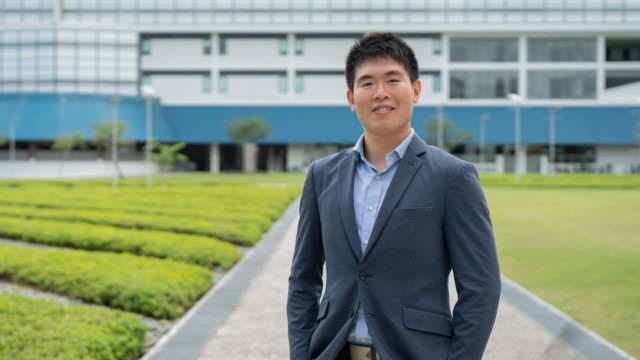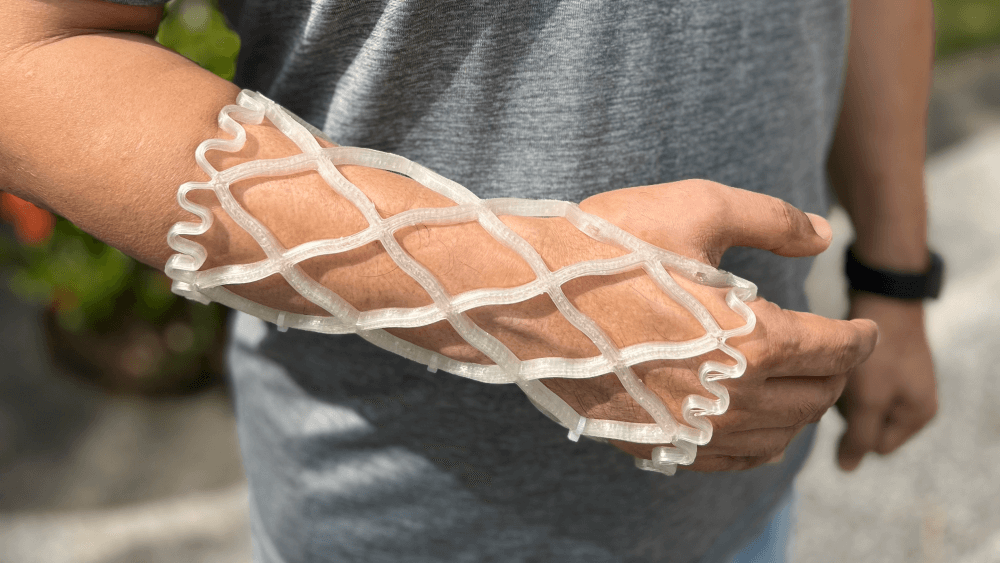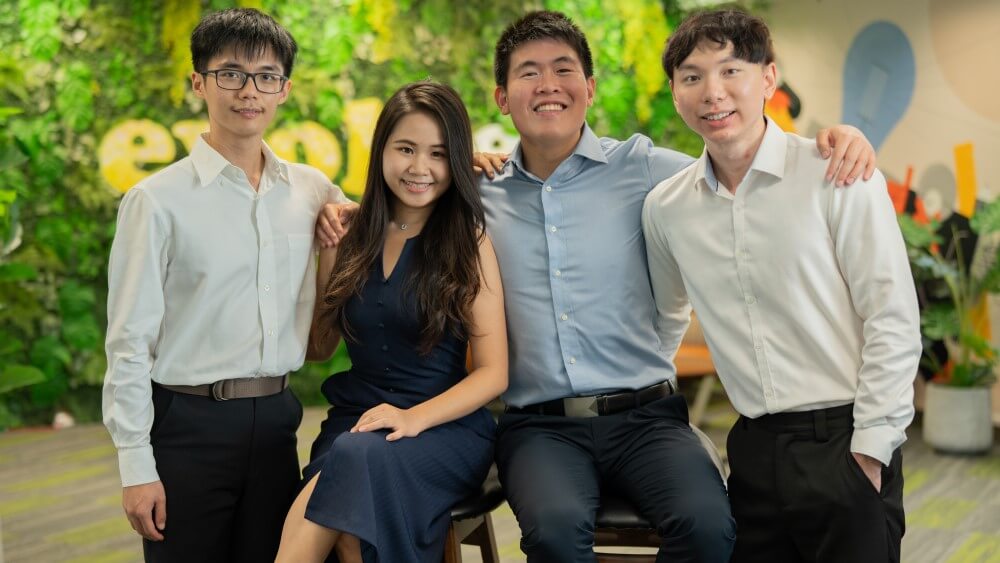
Redefining Healthcare with 4D Printing: The Castomize Journey
An accident during a mountain-climbing expedition led Abel Teo, an SMU alumnus, and his friends to found Castomize, a start-up that leverages 4D printing to produce orthopaedic casts. Their journey, marked by creativity, commitment, and a touch of ingenuity, has landed them a spot at the finals of the Lee Kuan Yew Global Business Plan Competition (LKYGBPC), organised by the SMU Institute of Innovation and Entrepreneurship. Abel shares more about Castomize’s journey and plans in future.
In the nexus of innovation and healthcare, a trio of visionary minds is making waves with their start-up, Castomize. Founders Abel Teo, Eleora Teo, and Johannes Sunarko are redefining traditional orthopaedic devices by making use of the transformative power of 4D printing technology. Their journey, marked by creativity, commitment, and a touch of ingenuity, has led them to the esteemed Lee Kuan Yew Global Business Plan Competition (LKYGBPC) finals.
A biennial initiative organised by the SMU Institute of Innovation and Entrepreneurship, the LKYGBPC is aimed at addressing modern-day challenges through university-led innovation and entrepreneurship. Named after visionary statesman Lee Kuan Yew, the platform serves as the meeting ground for the world’s sharpest entrepreneurial minds to convene.
“We are really honoured to be part of such a prestigious global competition,” remarks Abel, who graduated summa cum laude from the SMU Lee Kong Chian School of Business in 2021 with a degree in Business Management.
“Through the LKYGBPC, we hope to connect with like-minded collaborators and supporters who resonate with our purpose. This will enable us to refine our vision’s roadmap and expedite our journey towards its realisation,” Abel notes.
A fusion of vision and ingenuity
Imagine a group of friends embarking on an exhilarating mountain-climbing expedition – only to meet with a mishap. And that was how Castomize’s journey began. Instead of surrendering to adversity, the founding trio perceived the accident as a sign to revolutionise orthopaedic casts. The initial spark ignited a journey that eventually propelled them into the innovative realm of 4D printing.
“Initially, our prototypes were 3D printed casts, but after market testing, we realised the logistical complexities hindered adoption,” shares Abel.

The team, however, didn’t waver in their quest. Through relentless exploration of emerging engineering technologies, they found their answer in 4D printing.
While 3D printing involves creating three-dimensional objects layer by layer, 4D printing adds an extra dimension of time. In this process, the printed object can dynamically alter its shape, structure, or properties over time, in response to external stimuli such as heat, humidity, or light. Think of it as a superhero costume that can adapt to various situations.
This technology’s hallmark lies in its adaptive nature, as the lightweight, waterproof, and well-ventilated casts adapt seamlessly to patients’ limbs, with enhanced fit and functionality. For healthcare providers, the application process becomes easier and more precise, reducing the need for multiple personnel and external tools. It’s almost like receiving a tailor-made superhero suit to aid in one’s healing journey!
“Our vision has always been to make healthcare more accessible, effective, and less invasive; creating a world where everyone, regardless of socio-economic status, can lead fulfilling, healthy lives,” adds Abel.
Leveraging universities’ resources and entrepreneurship
In today’s VUCA world, entrepreneurial universities provide valuable incubatory resources that catalyse start-ups’ growth. By offering mentorship, funding, and industry connections, these resources accelerate product development and market entry, creating an environment where innovation can flourish.
In particular, Castomize’s early trajectory gained significant momentum through their participation in SMU’s Business Innovation Generator incubation programme.
“Besides equipping our team with entrepreneurial knowledge, we were supported with a financial grant to fast-track our prototype development,” Abel enthuses. Mentorship from industry experts, including Dr Timothy Low, CEO of Farrer Park Hospital, had enriched their journey.
Castomize’s innovative accomplishments had garnered mainstream recognition for the founding trio too. Their inclusion in the 2023 Forbes 30 Under 30 Asia list (Healthcare & Science) stands as a validating milestone of their success.
“The recognition indicated we were on the right path,” Abel Teo reflects. “The Forbes recognition motivated us to continue driving innovation, challenging the status quo, and making healthcare more accessible, effective, and less invasive.”
A future defined by transformation
Like any other entrepreneurial journey, Castomize faced its share of challenges. Key among them were product development pivots and team management. To counter this, the team embraced flexibility, even if it meant abandoning initially appealing concepts.
To overcome team dynamics challenges, Castomize employed a proactive approach to address performance issues among its core team members. This led to a more cohesive and effective team, and accelerated progress.

“Overall, setting proper, expected goals as a team, and having the discipline to respect these goals and make key changes have helped us in overcoming our team problems,” shares Abel.
Looking ahead, Castomize envisions a future rich in innovation. Their goal extends beyond orthopaedic casts, as they aim to develop advanced medical devices to integrate cutting-edge manufacturing concepts. For instance, new blood-vessel stents and precision drug-delivery mechanisms are among their ambitious aspirations. By embedding sensors and software into their devices, Castomize seeks to elevate healthcare information sharing to benefit both patients and providers.
Shaping healthcare’s future
Guided by healthcare stakeholders’ insights and leveraging the power of rapid prototyping, the team’s commitment to making innovative healthcare more accessible shines through. Their 4D-printed casts not only address sub-optimal medical environments, but also reflect their dedication to enhancing global healthcare accessibility through affordability and re-manufacturing.
Additionally, their products are designed for minimal intrusion into patients’ lives, aligning with their vision of providing hassle-free solutions that adapt seamlessly to daily routines. The future holds even more promise as Castomize works on 4D-printed medical devices, including precision drug-delivery mechanisms.
As a finalist in the LKYGBPC, Castomize’s presence echoes the theme of “Innovations Beyond Boundaries,” symbolising their trailblazing journey that transcends conventional orthopaedic solutions.
In Abel’s words, his advice to aspiring entrepreneurs is a heartfelt one: “Don’t give up, but at the same time, be smart and let go of concepts when they are not viable in the market – in order to find ones that are.”
The journey of Castomize is indeed a testament to the transformative potential that innovation holds in reshaping healthcare for the better.
Castomize was a finalist in the Human Health and Potential category of the 11th Lee Kuan Yew Global Business Plan Competition (LKYGBPC), a biennial university start-up challenge organised by the SMU Institute of Entrepreneurship (IIE).




